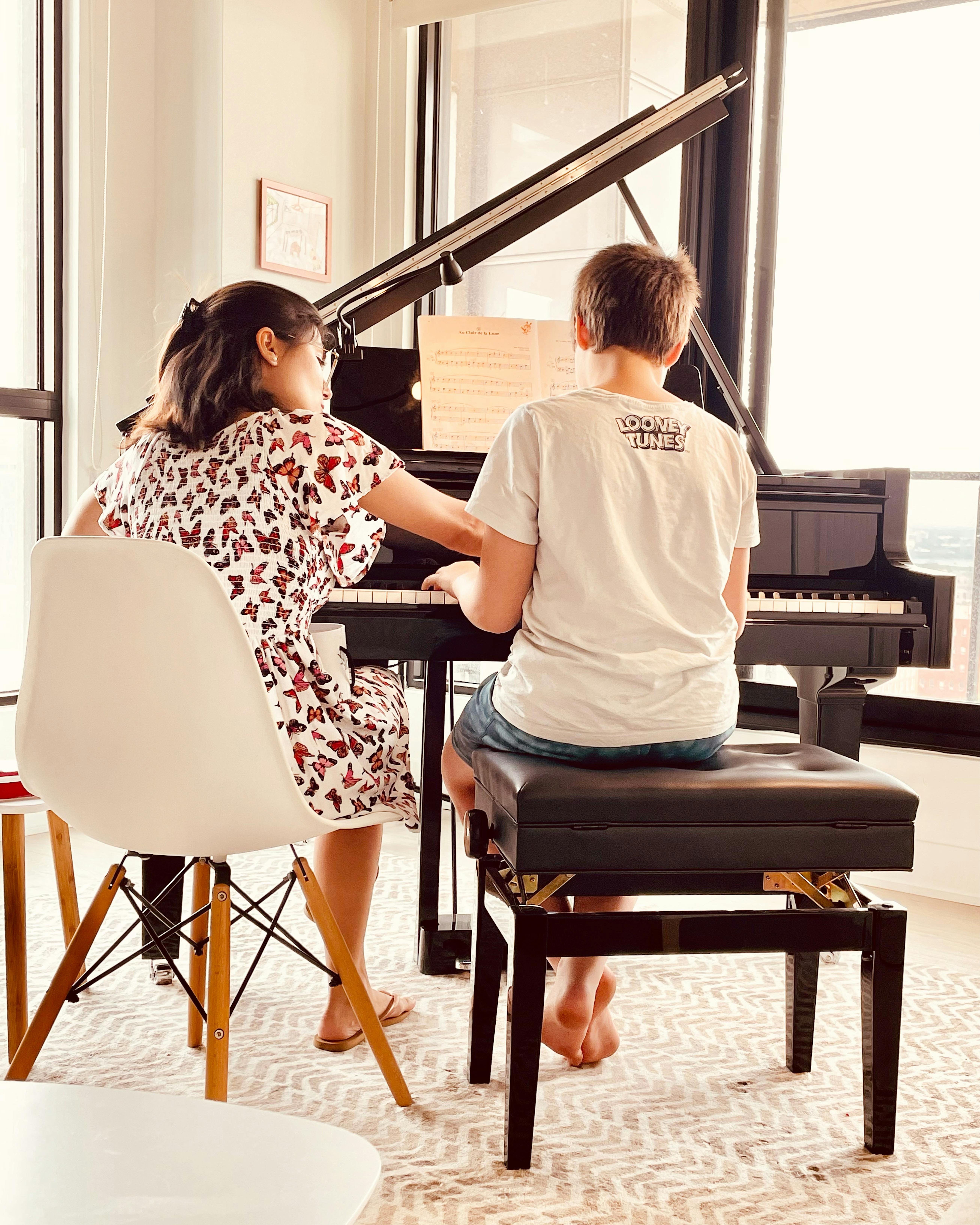Classical Piano Course
Piano classes are based on the classical approach to music teaching. Our piano program covers Technique, proficient note reading and musicality are the playing fundamentals that are taught to our students. We use a variety of methods to do this including scales, technical exercises, etudes, as well as classical repertoire. Music theory and ear training are also helpful tools to help students better understand their music. We teach theory and ear training, through the use of theory workbooks, to all ages and encourage students to take a standardized theory test every year. During the program students will play wide range of classical music and favorite songs of student's choice. Students have great fun playing along with the backing tracks.
Skills You Learn As A Beginner
- ◆ Introducing the instrument and learning 12 notes music theory with practical playing examples daily.
- ◆ How to read music (Treble Clef & Bass Clef Notes) using interactive sheet reading exercises regularly.
- ◆ Finger exercises in 'C' position with right hand & left hand for strength and flexibility improvement weekly.
- ◆ Songs based on Treble Clef, Bass Clef & Grand Staff for better understanding of musical structure fundamentals.
- ◆ Songs based on open chords and basic techniques to develop foundational performance and rhythm skills efficiently.
- ◆ Assistance in setting up a practice routine tailored to each student's unique musical goals effectively.
Piano Class Learning Outcomes
- In debut piano class students will develop elementary skills, techniques, coordination and musical understanding. There is also an opportunity to build on basic improvisation.
- Students will develop a good sense of expression, have a strong grasp of stylistic awareness and there is also the opportunity to improvise which is now individual, assured, accurate and expressive.
- Students will be able to improvise with conviction and personality plus demonstrate strong musical form and structure. There will be mature and authentic stylistic awareness, with developing individuality and communication.
Benefits For Kids
Kids who play the piano have improved fine motor skills and, unlike other instruments, the piano requires both hands to work independently of each other, one moving fast while the other may be moving at a slower rate.
Boosts Focus
Increased eye hand coordination is almost a given for children that learn to play the piano, but there is more than that. It also sharpens their concentration, enhances multitasking skills, and boosts memory retention.
Cognition
Reading a piece of music takes a great deal of focus, causing a child to interpret a note and a rhythm, translate it into hand movements on the keyboard, and then immediately go on to the next one, improving dexterity.
Creative Thought
Reading and playing music allows them to think both critically and creatively, which is a skill that will assist them in anything they choose to undertake in the future. It fosters problem solving and adaptability, key traits for success.
Why Learn Piano?
The piano is one of the most accessible and welcoming instruments for beginners. Learning the piano not only helps you master the instrument itself but also builds a strong foundation in music, enhances your understanding of music theory and nurtures general musicianship that applies to all instruments. The piano is one of the most accessible and welcoming instruments for beginners. Learning the piano not only helps you master the instrument itself but also builds a strong foundation in music, enhances your understanding of music theory, and nurtures general musicianship that applies to all instruments. As a versatile instrument, the piano can adapt to any musical role, continuing to play a central part in musical development today. Whether in solo performances, accompaniment, or as part of a band, the piano spans genres like classical, pop, rock, jazz, and Latin, solidifying its place in the world of music.
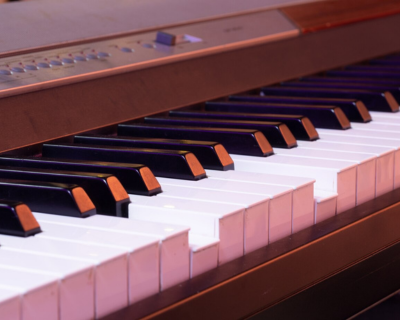
Piano Lessons For All Levels And Schedules
One of the most familiar musical instruments in the world is the piano. Its elegance and majesty give it a timeless class. While it can be challenging to start learning piano or keyboard skills as an adult, our program makes it approachable and rewarding.
For more experienced learners, we offer intermediate and advanced level lessons up to level 5, covering improvisation and accompaniment techniques. Classes are available on weekdays and weekends.
Our flexible part time courses allow you to schedule sessions during the day or evening. Learn in a supportive environment with expert instructors who will help you enjoy and master the piano at your own pace.
Features In Piano Class
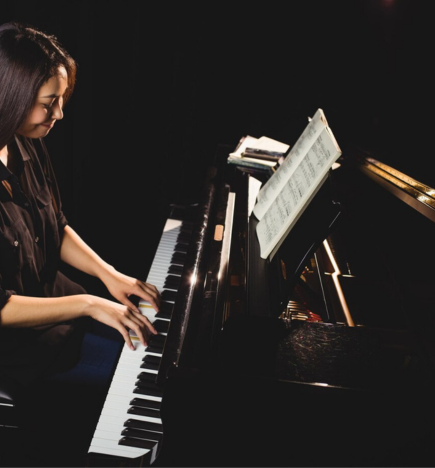
Notations
Piano notation is a system of symbols used to represent music on paper. It enables musicians to understand and perform compositions accurately. Symbols are placed on the staff to represent specific musical pitches. A hollow note head with no stem is held for four beats each.
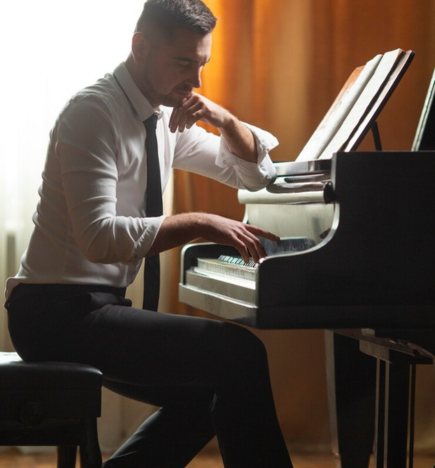
Bar Chords
Bar chords on the piano refer to a technique where the pianist uses one finger, usually the index finger, to press down multiple keys across the same row of keys (usually white keys) to play chords. Bar chords on the piano allow for smoother chord transitions and give the player more versatility.
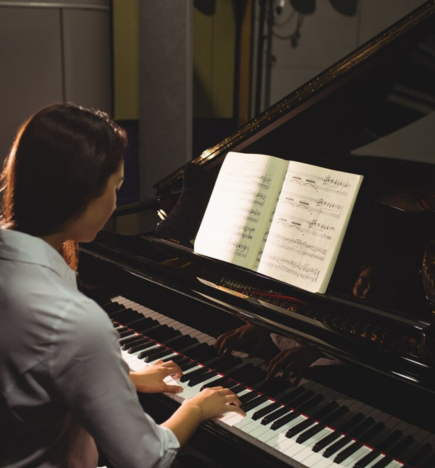
Lead Scales
Lead scales on the piano refer to the use of scales and scale patterns to create melody lines, often used in lead playing or soloing. Lead refers to the melody or the prominent musical line, which is typically played by the right hand. Lead scales are essential for improvisation and soloing.
Comprehensive Piano Education
We provide thorough piano education that covers technique, theory and musical expression, ensuring a well rounded and truly holistic development for every student.
International Piano Certification
Our piano certification programs, including recognized diplomas and exams, offer students the chance to validate their skills internationally, enhancing their musical career prospects.
Personalized Teaching Styles
Our instructors use a variety of methods tailored to each student's learning style, helping them engage with the material in the most effective way for their development.
One On One Piano Coaching
We prioritize individual attention to ensure that each student receives focused guidance, enabling them to overcome challenges and thrive in their piano journey.


